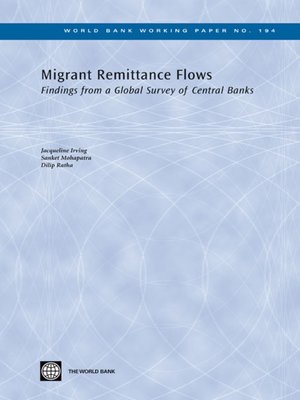Migrant Remittance Flows
ebook ∣ Findings from a Global Survey of Central Banks · World Bank Working Papers
By Jacqueline Irving

Sign up to save your library
With an OverDrive account, you can save your favorite libraries for at-a-glance information about availability. Find out more about OverDrive accounts.
Find this title in Libby, the library reading app by OverDrive.



Search for a digital library with this title
Title found at these libraries:
| Library Name | Distance |
|---|---|
| Loading... |
Drawing on the findings from responses to a survey conducted in 2008-09 from 114 central banks worldwide (of which 33 are in Africa), Migrant Remittance Flows aims to better understand how central banks and other national institutions regulate and collect data and other information on cross-border remittance flows. Findings indicate that, although the vast majority of countries, in both sending and receiving countries, collect data on remittances, and 43 percent of receiving countries estimate informal remittances, there is a need for more frequent and better coordinated data collection, both across national institutions and among different divisions within the same national institution, as well as between countries. Survey results also indicate that many new market entrants' transfer activities are unregulated. Countries must take into account new channels and technologies, such as mobile phone service providers, in monitoring remittance flows. It will be important for national regulatory authorities to work closely with mobile telecoms network operators to strike the right regulatory balance, to better understand these new channels' associated risks and fully tap their potential for fostering inexpensive, efficient remittance transfer services. The high cost of transfers was cited in the survey as the top factor inhibiting migrants from using formal channels. Many countries, particularly in Africa, have made progress in rendering exclusivity contracts illegal, which helps increase competitiveness and reduce transfer costs. But further policy reforms and initiatives are needed to address the high costs of remittances.
The joint African Development Bank-World Bank Africa Migration Project and G-8 Global Remittances Working Group provided partial funding support for this study.







